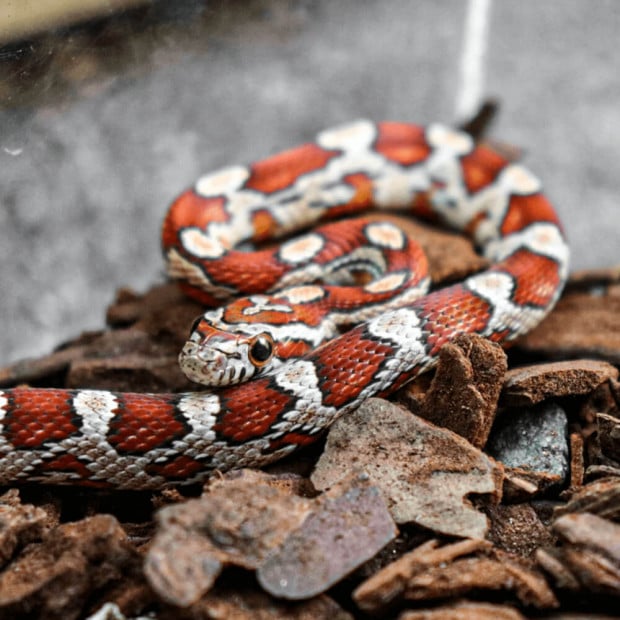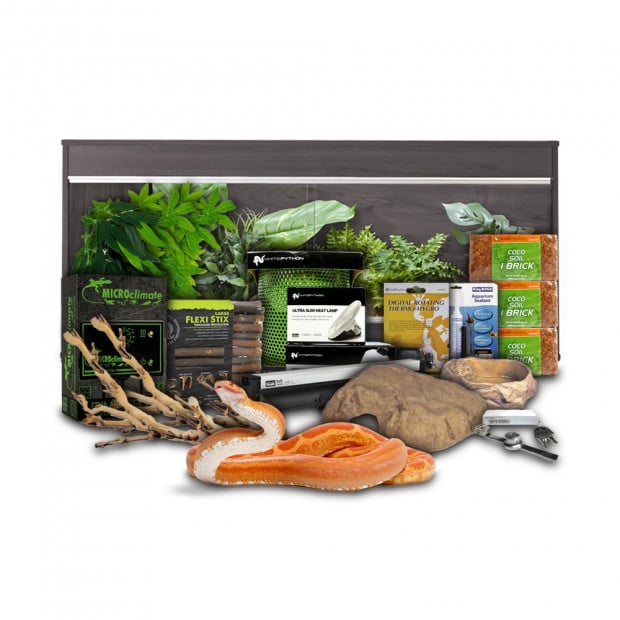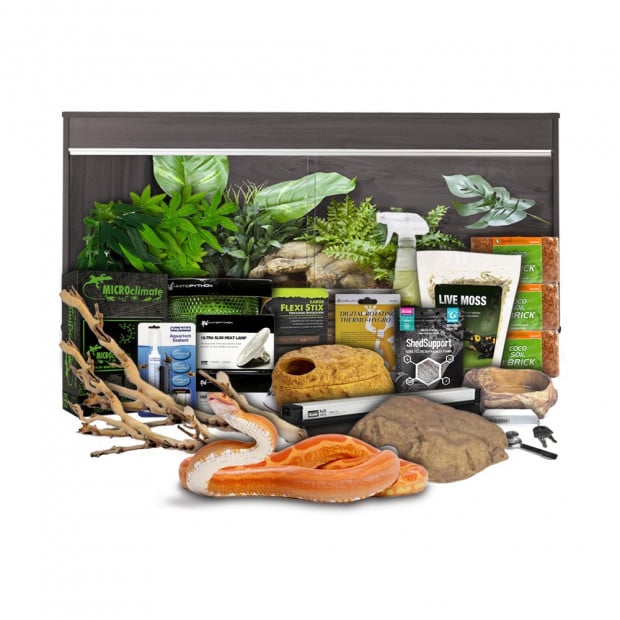-
Categories: Care sheetsSnakes
Corn snake, Pantherophis guttatus, care sheet
Corn snake, Pantherophis guttatus, husbandry guide from the experts at Swell Reptiles, covering housing, heating, lighting and more.
- Corn snakes are a favourite for beginners
- Manageable sized snake that is easily tamed
- Hundreds of stunning colour and pattern variations
Do Corn snakes make good pets?
Corn snakes are one of the most popular beginner snakes due to them being a manageable size and easy to tame. There are hundreds, perhaps thousands of morphs available making the rarer variations popular with experienced hobbyists too. Although they are relatively calm snakes, they can become easily stressed when kept with other individuals so this species should always be kept alone. Despite naturally occurring in North America, all of our corn snakes are captive bred in the UK, greatly reducing the impact on the environment and the risk of diseases.
What size vivarium should I get for my Corn snake?
Corn snakes are terrestrial, arid snakes, meaning they spend most of their time on the ground and prefer a drier environment, although they will enjoy some low branches and perches to climb up and slither around.
At Swell Reptiles, we recommend a minimum enclosure size of 120 x 60 x 60cm (4 x 2 x 2ft) for a fully grown adult, although hatchlings and juveniles can be kept in smaller enclosures. Due to their arid nature, wooden vivariums, such as the VivExotic Repti-Home (AAL) Vivarium Medium Oak, work best, as they tend to hold heat a lot better than glass terrariums, and also tend to be sold in larger sizes. To simplify things, why not take a look at our range of Corn Snake Starter Kits, suitable for juveniles and adults.
How do I heat my Corn snake enclosure?
As Corn snakes, along with all reptiles, cannot control their own body temperature, they rely on their environment to warm or cool themselves as required. In captivity, this means we must provide them with a thermogradient from one end of the enclosure to the other. The ideal warm end temperature for Corn snakes is between 30-32°C (86-89°F), which is most easily achieved using an overhead heating system such as heat bulbs or a ceramic heat emitter.
In most instances, Corn snakes do not require any additional heating overnight unless your home drops below around 15°C (59°F). If you fall into this bracket, you may wish to add some low-level supplementary heating overnight in the form of a ceramic heat emitter or heat mat, but to avoid unnecessary stress this should not be a light-emitting heat source.
It is of utmost importance that any heating equipment is controlled by a compatible thermostat to avoid overheating, for basking lamps this would be a dimming thermostat, for ceramic heaters, a pulse thermostat is required, and for heat mats, you can either use a simple on/off thermostat, or a pulse thermostat. Corn snake heating equipment should also be covered by a heat guard, as they are likely to climb up and even wrap themselves around the fixture, so this will avoid unwanted accidents.
Do I need UV lighting for my Corn snake?
As Corn snakes are diurnal (awake during the daytime), they are naturally exposed to plenty of sunlight, so captive enclosures should be able to replicate this. They do only require a relatively low-level UVB compared with some other diurnal species, and do best in a UVI of 1-2 which makes the Arcadia ShadeDweller Max a great option if the fixture is between 25-38cm (10-15”) above the highest basking point. If this distance will be greater, but no greater than 45cm (18”), the Arcadia ProT5 Kit - Forest 6% would be a better option.
Which substrate is best for Corn snakes?
At Swell Reptiles, we recommend the use of loose, soil-based substrates such as coco soil for Corn snakes. These substrates encourage natural burrowing behaviour, and can also assist in increasing the humidity a little during the shed cycle. The addition of leaf litter on top of the substrate can also provide enrichment and further encourage those natural behaviour patterns. Some substrates such as Aspen can be quite dusty and lead to respiratory issues, so we prefer to steer clear of these for Corn snakes.
How do I decorate a Corn snake’s vivarium?
Despite being terrestrial snakes, Corn snakes will appreciate some branches and vines to climb up and slither around. They will also thank you for adding at least two hiding caves into their enclosure, one in either end so they can feel secure across the entire thermogradient. A good-sized water bowl is also important, generally, you should be looking to get a dish large enough for your snake to soak in if they wish, which can be particularly helpful when they are about to shed their skin.
Further cover and decoration can be provided using either real, or artificial plants placed around the enclosure, for example, the Swell Trailing Abutilon. The placement of such decor is mostly down to personal preference and the aesthetic you hope to achieve, but they should be evenly placed across the length of the vivarium to provide consistent cover and be more appealing to the eye.
What do Corn snakes eat?
Being quite slender snakes, Corn snakes are often overfed in the hobby with foods that are a little too high in protein which can lead to obesity and other related health issues. Due to this, we prefer feeding frozen mice as a staple to our Corn snakes over rats or multimammates as they are lower in fats and proteins, but other food options such as frozen chicks or frozen rats can be offered from time to time to add variety to their diet.
How do I buy a Corn snake?
We always have a variety of UK captive bred Corn snakes for sale at Swell Reptiles. If you like the look of any of our available Corn snakes, please nip down to our store to see us, we will ask to see some images of your set-up and ask a few questions to assess your suitability for adoption. We reserve the right to refuse adoption to anyone we feel is unprepared to do so.
For more detailed husbandry information regarding the stunning Corn snake, please see our dedicated Corn Snake Care Sheet.
| Common names | Corn snake |
| Scientific name | Pantherophis guttatus |
| Country | North America |
| Captive-bred | Yes |
| Adult size | 120-150cm (4-5ft) with females tending to be larger |
| Natural habitat | Forests, rocky regions, farmland |
| Housing | 120 x 60 x 60cm (4 x 2 x 2ft) |
| Ideal temperature | 30-32°C (86-89°F) (warm end); 22°C (71°F) (cool end) |
| Ideal humidity | 40-50% |
| Diet | Frozen rodents (mice) |
| Average lifespan | 15-20 years |
| Personality | Docile |
| Ease of handling | Easy |
| Cohabitable | No |
-
 Tessera corn snake, Pantherophis guttatusFrom £70.00In stock
Tessera corn snake, Pantherophis guttatusFrom £70.00In stock -
 Terrazzo corn snake, Pantherophis guttatusFrom £95.00Out of stock
Terrazzo corn snake, Pantherophis guttatusFrom £95.00Out of stock









